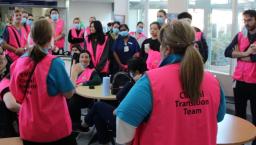ONC awards $2M to new 2023 LEAP in Health IT winners

Photo: MR.Cole Photographer/Getty Images
The Office of the National Coordinator for Health IT this week announced $2 million in new award funding for the most recent innovation projects under its Leading Edge Acceleration Projects in Health Information Technology initiative.
WHY IT MATTERS
The LEAP in Health IT program is meant to recognize and encourage healthcare organizations that are pioneering new approaches and tools to harness information technology toward better care delivery, advance clinical research capabilities and help solve long standing challenges, especially around data interoperability.
For this year's edition, ONC put a special emphasis on two research imperatives:
-
Exploring the use of advanced HL7 Fast Healthcare Interoperability Resources capabilities.
-
Identifying data quality improvements for United States Core Data for Interoperability data elements.
For their work on FHIR uses cases and data quality for USCDI, respectively, the agency is funding HEALTHeLINK, the not-for-profit regional health information organization for western New York, and Boston Children's Hospital for further innovation research.
Exploring advanced FHIR capabilities
HEALTHeLINK – where hospitals, physicians, payers and others collaborate across eight western New York counties to exchange clinical information – be working on a new project, "Advanced FHIR Capabilities for Advance Care Planning Use Cases to Improve Patient Care."
It will focus on the challenge of advance care planning documents aggregated from disparate sources and not easily accessible at the point care.
The plan is for HEALTHeLINK to explore FHIR-focused software development using open-source code, implementation, testing and piloting under real-world conditions, with the following objectives, according to ONC:
-
Demonstrate advanced FHIR for the onboarding use case to aggregate advance directive (AD) metadata and PDFs from primary care practices and hospitals via electronic health record (EHR) vendors.
-
Demonstrate advanced FHIR for the HIE/interoperability use case.
-
Demonstrate advanced FHIR real time query by adding AD data sources, such as eMOLST (NY repository) and My Directives (national repository).
-
Demonstrate advanced SMART on FHIR app and FHIR application programming interface (API) endpoint use case with primary care providers, hospitals, hospices and emergency medical services (EMS) personnel.
-
Demonstrate advanced FHIR real-time trigger and real-time query for emergency departments, pre-visit planning and AD use cases.
-
Develop HIE AD data analytics and reporting for population health activities, research and targeted community education to increase AD use and reduce disparities.
The goal is to speed the adoption of advanced FHIR by showing its value for solving complex problems in healthcare interoperability.
Quality improvements for USCDI
Boston Children's Hospital, meanwhile, will be focused on CumulusQ – an open-source platform for improving FHIR data quality across the ecosystem. The project aims to develop and build out an interoperable health IT ecosystem enabling easier access to high-quality, standardized healthcare data – with a key focus on United States Core Data for Interoperability data elements in FHIR format, critical to ONC's TEFCA efforts.
The objectives, according to the agency:
-
Formulate and implement an iterative process to comprehend and assess the quality of both structured and unstructured USCDI elements.
-
Materialize the iterative process from Objective 1 into an easily deployable, open-source infrastructure leveraging FHIR APIs in care delivery sites.
-
Implement the tooling from Objective 2 at multiple sites in the CumulusQ network, and once refined, disseminate a snapshot of the data quality at those sites as a representative benchmark, with root cause analysis of data anomalies.
THE LARGER TREND
ONC set up the LEAP in Health IT Program five years ago, as an effort to fund leading-edge research on a variety of clinical and technological imperatives, such as decision support at the point of care, population-level data-focused APIs, tools to make electronic health records more AI-ready, referral management strategies that address social determinants of health and more.
In 2020, for instance, the awards funded a range of hospitals, health systems, HIEs and public health agencies with $2.7 million to study a variety of interoperability and data exchange projects.
ON THE RECORD
"We are eager to see these new awardees get started and what they can do leveraging FHIR and USCDI," said Steve Posnack, deputy national coordinator for health information technology, in a statement.
Mike Miliard is executive editor of Healthcare IT News
Email the writer: mike.miliard@himssmedia.com
Healthcare IT News is a HIMSS publication.
























